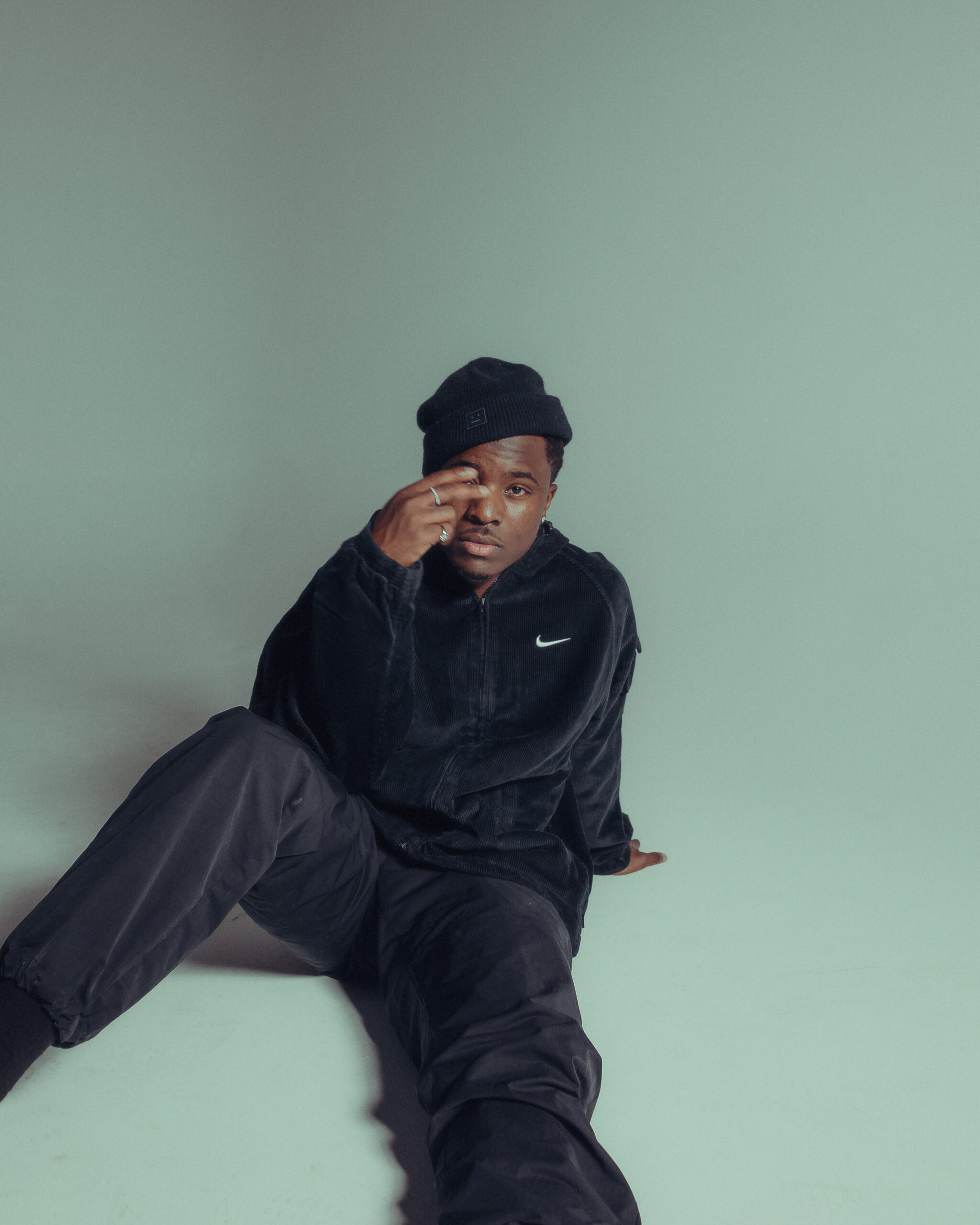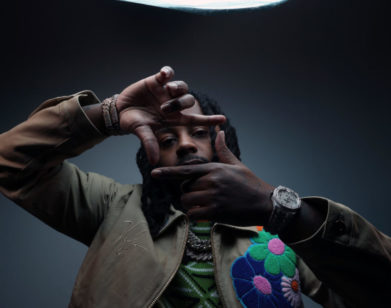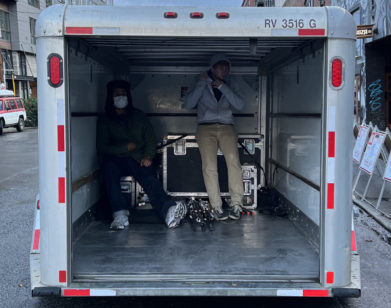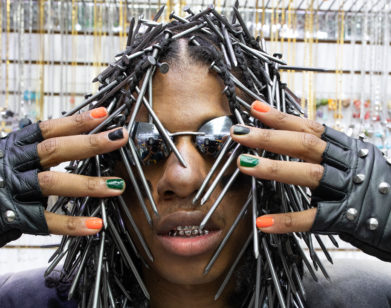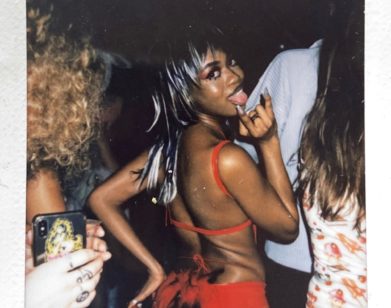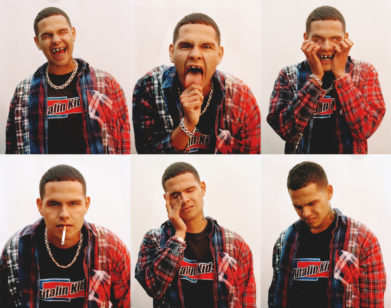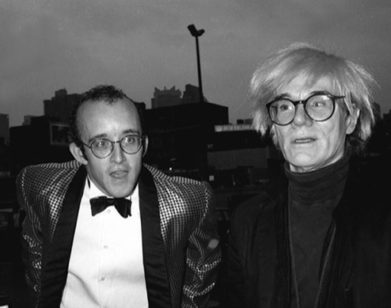in conversation
“We’re Breaking That Stigma”: IDK and Saucy Santana Talk Homophobia in Hip-Hop
If you’ve been to the club lately, you’ve heard “Pinot Noir,” the face-down, ass-up song from the British-American rapper IDK featuring Jucee Froot and Saucy Santana. Featured on IDK’s latest album F65, “Pinot Noir” samples “My Neck, My Back” and sounds like one of those raunchy, early 2000s tracks that make you want to pop your pussy, as Khia put it on her timeless 2001 hit. IDK knew ‘Tana was the only rapper in the game that could carry its bad bitch energy, so he reached out via DM. He suspected that tapping a flamboyant and openly gay rapper like Saucy for a feature might spark discourse—and it did, reigniting a decades-old conversation about homophobia, tolerance, and toxic masculinity in hip-hop. But a bop is a bop. Earlier this month, on IDK’s birthday, the rappers chopped it up about coming out, stigma in rap music, and throwing hands in high school.
———
SAUCY SANTANA: Hello.
IDK: What’s up?
SANTANA: What’s going on?
IDK: Can you hear me?
SANTANA: Hello?
IDK: Yeah, sorry my service is going in and out.
SANTANA: We can hear you now.
IDK: Bet, perfect. It’s good to hear from you. I know it’s been a while.
SANTANA: Happy birthday.
IDK: Thank you. I appreciate it. I was going to hit you to see if you was in L.A. but I had a feeling you probably wasn’t.
SANTANA: Nah, you know I’ll be in Atlanta.
IDK: We’ve been getting some good traction on the song, man. It’s funny, I was with Dave Chappelle, we were at the Lakers game, and one of the guys there said, “Yo man, I love the album.” The guy was working at the bar. I was like, “What’s your favorite song on there?” He said, “Pinot Noir.” He’s like, “I hate to say it, you know what I’m saying? But it’s ‘Pinot Noir.'” I’m like, “Why you say you hate to say it?” He’s like, “You know why I said that.” You see, it’s funny, I didn’t grow up in the hood. I grew up more middle class, but I was surrounded by the hood. So a lot of the people there, they got a whole way of looking at this. Normally they would not accept nothing like this. But because it’s me, everybody’s at least willing to say, “Let me see what he’s up to.”
SANTANA: Yeah. You can’t deny that shit. I get the same thing. When people started getting hip and started listening to my music. They was just like, “Bro, it’s hard.” I did Wild ‘n Out yesterday and there was a lot of boys there yesterday, like, “Man, I ain’t going to lie. You be getting off. Yo shit be hard.” I get that all the time. Niggas just be scared to come out and say it. They don’t want to get on the internet and say.
IDK: Nah. But the good part about this: changing the stigma and letting people understand music is music.
SANTANA: For sure.
IDK: Because I always tell everybody how I grew up, this was not something that I saw myself doing five years ago. How I grew up, you know how it is. Especially if you grow up in the hood, everybody, all the black dudes, we all grow up homophobic, “Stay away from that.” You get made fun of, you know what I’m saying?
SANTANA: Yep.
IDK: Look, the craziest thing is, all the dudes that were gay growing up in middle school and high school, they could fight really fucking good. I remember my man, his name is Damontre, he used to always get picked on until one day he just stood up for himself and beat the shit out of this one dude.
SANTANA: We all had our moments. Dudes had to jump me in high school. I was whooping ass like, “Don’t play with me!” I grew up with my daddy so I didn’t grow up picking on girls and fighting girls. I grew up fighting boys. Even when I was a little boy, I just always was in the field with niggas though. It was just always in me.
IDK: Right, right. Because of that, I remember he got respect and nobody ever fucked [with him]. They just accepted, “All right, so he’s gay, it is what it is.”
SANTANA: He’s going to bust your ass so we going to leave him alone. Because niggas also, they embarrassed. Once a gay beat you up, it’s like “Aw man.”So maybe it’s not even wanting to chance it. I see that in the hood a lot of times.
IDK: Exactly. That’s facts and that’s kind of how it is. For you, how was it? Were you open with it from the moment you knew or was it something you had to eventually come out and let people know?
SANTANA: I grew up kind of the same way as you. I grew up middle class. My mama, a three-story house, five acres of land. We was having it. My daddy was a celebrity bodyguard when I was a kid. I’m originally from Connecticut. So when we stayed up north, this was when 50 Cent, Jim Jones, Lil’ Kim, Trina, all of them. But I grew up with both of my parents and my mama was just the type of person like, “Grown people take care of themselves. So as long as you a kid and you living in my house,” she wasn’t having it. I ain’t really come out until I was like, 17. That’s when I just got the courage to be like, “Yo, it is what it is.” Everybody already knew.
IDK: Okay, so people suspected you?
SANTANA: Yeah, people knew. I always had girlfriends though. We gay, so all my bitches was bad growing up. I always had the dark-skinned Barbie bitches.
IDK: Yeah.
SANTANA: I came out to one of my family members. I’m cautious with down-low men because I know how it feels. I came out to one of my cousins and I confided in him. He ended up going home, telling his mom, which was my auntie. She ended up calling her mom, which was my grandma’s sister. “Rashad told Karan, blah blah blah.” I remember I was smoking weed already at the time, so we used to have the Visine so you wouldn’t look red and dilated. I walked into my grandma’s house, I did my Visine, I done sprayed up my perfume and all that. She’s looking at me crazy as hell. I’m like, “What? Here we go.” Then my auntie walked in, “She ain’t talking about no weed.” I sat down with my mama, told her what type of time it is and just really felt better ever since. I just wasn’t comfortable with how it came out, you know?
IDK: Right. I mean you didn’t control it the way that you wanted to, but you at least was able to live with it after that. I think freedom is so important, to be free and be yourself. That’s why I think I really gravitated to what you do. The first song I heard from you was the “Walk” song I think, it’s funny because that dude, Rolling Ray. Is that his name?
SANTANA: Mm-hmm.
IDK: I don’t know if you all was beefing or whatever, obviously that song got stuck in my head. I’d seen that and then I heard “Material Girl” and I just couldn’t stop singing that hook. I mean, I’d be around my friends and shit and they’d be like, “You see this?” I’m like, “Yeah, this shit’s fire, you know what I’m saying.” That’s when I became a fan from afar. I wasn’t digging into nothing yet. It’s always a thing when we reach out to another guy who may not be straight or who may be gay. There’s that thing of “You in the DMs.” You know what I’m saying? That crossed my mind, but I was like, “I really don’t even care bro. I’m just going to do it.”
SANTANA: I appreciate you expanding your mind and just taking a chance because I was able to show you a different side. Sometimes boys see gays, especially me—feminine, flamboyant—and it’s a stigma. You think a gay going to try to talk to you or a gay going to have a crush on you, and not everybody move like that. I grew up middle class but once I got older, I did a lot of things to get money before rapping. I was really in the trap with niggas. I know how to carry myself and I’m going to just always be me. Ain’t going to sugarcoat it for you. I’m not going to disrespect you. I ain’t going to try you. I’m not going to do nothing weird or make you feel uncomfortable. I feel like you was able to see that. Me and you got each other now, we be on FaceTime and some other shit.
IDK: Yeah, exactly.
SANTANA: Strategically, when I started rapping, I wrote and rapped from a female standpoint. So that’s why when people hear the song, they like it. When I first started rapping there were other gay boy rappers too, but I felt like the rapping was very harsh and left them in just an LGBT box. If I only rap about things from a gay perspective, I feel like it limits the audience because nobody else can understand it. We black, we in the hood, so a lot of my music gets played in the club, so I learned to rap from a female standpoint. I have a big female following. Girls love me.
IDK: Trust me, I know.
SANTANA: As a kid growing up in high school I was cool with all the boys because all the boys were like “Man, ‘Tana be with all the bad bitches.” They go hand-in-hand.
IDK: It’s so crazy because I never really got posted and I got on The Shade Room one time for something special that I did that people really loved, but other than that, I’ve never really had that. The moment that happened, I started getting hit up by every girl that I know, “Hey, it’s so attractive that you are comfortable with your sexuality and da da da.” I never even knew that was a thing, you feel me?
SANTANA: Yeah.
IDK: It’s just crazy to see that a collaboration like ours can change the way a lot of people think of things, even me. The biggest thing that I wanted to say too is that this is the first time that somebody black, not because black makes it more special or whatever, more because the stigma around black people and homophobia is—
SANTANA: In hip-hop, period.
IDK: Exactly.
SANTANA: You called me to get on your song. I feel like that’s what makes it so much more special, that you was fearless and was like, “Bro got talent, I think he fits my song. Imma reach out.”
IDK: Right.
SANTANA: Niggas is not doing that. I run into a million rappers and they like, “You hard, bro. We got to get in, we got to get in.” Niggas want to come in the studio, niggas want to write, niggas want to produce, niggas who have features but in the back of their head they still like, “What’s the hood going to think, what the streets going to think?”
IDK: Exactly. So this is why this is so important and I think we keep pushing this song. I see this song becoming a staple—a song that everybody loves. I believe that this song is going to bring so much change, so thank you for even considering it and thank you for doing it, and thank you for doing it again, and going even harder. You feel me?
SANTANA: Yeah.
IDK: Appreciate that. And just even this conversation.
SANTANA: Yeah, this is what people got to see because when they first sent me the track I didn’t know who you was then. So I had so many mixed feelings. I’m like “Niggas don’t do this, is this some corny shit his label trying to make him do?” You know it be a lot of politics in music. I ain’t even cut it until after I really got on the phone with you. I’m a vibe person, I’m an energy person. So the first time we chopped up, I’m like, “Nah, he seem like a real nigga.” This wasn’t no, “Oh let’s try to get the LGBT crowd.” Now I appreciate you for just even expanding your mind and stepping out, being fearless, not being homophobic, not caring what people think.
IDK: Exactly. And we’re breaking that stigma. So that’s why I want to say thank you for that. Thank you for having this conversation with me, man. And I hope we can continue to work on more music.

